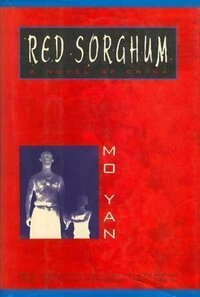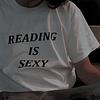Take a photo of a barcode or cover
Our narrator’s grandparents and father are legendary. Family members and friends tell stories of how the narrator’s grandmother helped defeat the Japanese or how his grandfather was king of bandits in Shandong Province. The story of the narrator’s family is the story of China in the twentieth century: tragic, violent, and haunting. In Mo Yan’s Red Sorghum, originally serialized in China in the 1980s and later translated into English by Howard Goldblatt, the narrator tells us the real stories behind the legends...
Read the rest of my review at A Bookish Type.
Read the rest of my review at A Bookish Type.
challenging
dark
slow-paced
challenging
dark
reflective
slow-paced
Plot or Character Driven:
Character
Strong character development:
Complicated
Loveable characters:
Yes
Diverse cast of characters:
Yes
Flaws of characters a main focus:
Yes
Graphic: Body horror, Child death, Death, Gore, Rape, Sexual violence, Torture, Death of parent, War
challenging
dark
emotional
informative
reflective
sad
tense
slow-paced
Plot or Character Driven:
Plot
Strong character development:
Complicated
Loveable characters:
Complicated
Diverse cast of characters:
Yes
Flaws of characters a main focus:
Yes
What's the biggest crime against the victims of an atrocious time? Forgetfulness.
This book follows the tumultuous history of the North-Est Gaomi region, Shandong prefecture in China during the Japanese invasion in the Second Sino-Japanese War through the lens of 3 family generations, in which Dai Fenglian-an unexpected heiress and her lover, comander Yu Zhan'ao - both a bandit and a hero of the peasants, stand out as cornerstones of the narrative.
I will not list a slew of content warnings, but I want to underline that we get to experience the reason why between Chinese and Japanese people is such a deep hatred that only now starts to fade into history's pages.
<b>Please approach this book with extreme caution and be prepared to read about war crimes and cultural diferences(traditions, customs, and "this is how it was done here back then") that may/will affect you! </b>
Despite the fact that "Red Sorghum" is such a reality-level cruel story given to us most of the time through a child's perspective, the writing style is the most beautiful one I've read to date!
It's a dens book with a lot of description, but in no way it drags. The length at which Mo Yan went to express atmosphere and emotions through colors, sounds and light is phenomenal. For the entire book we get to see the red of the sorghum, the red sky at dawn and the heavy atmosphere reeking of blood and death. We get to be the child seeing all these and understand the trauma they experienced during the Japanese invasion of Manchuria. We hear, see and breathe what is happening in the story. It will shock you speechless.
<b>If you enjoy reading Tolstoy and Garcia Marquez, Mo Yan will be right up your alley...having ideas and themes just like Tolstoy and a writing style similar to Garcia Marquez, only dialed up to 100.</b>
Going back to the actual review, we have multiple timelines that are created using memories and visual keys for a character connecting feelings or situations. The narrator is cleverly used to express why the scene is perfectly normal or accepted in Chinese culture, and gives you the desired impact for each instance he adresses the reader. This non-chronological first person style combined with elements of magical realism and bare-bones reality is most unnervingly great.
I believe that each chapter is representative of it's title and manages to surprise you with a variety of possible meanings and scenes connecting it all.
My favorites are also the most shocking for me, so I will mention them in a way only someone who read the book will know: uncle Luohan's punishement, the exhumation scene, the attack on the funeral, the weighing scene for the flower name, the last chapter as a whole.
<b>Mo Yan represents life and nature(through the red sorghum fields) as givers of life and unstoppable forces that are above humans and animals, without mercy or care for the ones that it's feeding; an apathetic bystander in history.
As themes explored, we have forgetfulness of history and it's victims, human nature, the meaning of heroism and life.</b>
As for the plot, we don't have a concrete ending, but all the important parts in creating and cementing the characters we get to know are really well done, so if you enjoy reading a snapshot during the most important part of someone's life, and don't necessary need every detail, I think you will appreciate the story more.(this is especially true if you are not used to reading literary and historical fiction)
The characters we have are complex, multilayered ones that I both love and hate..especially comander Yu. Most of the cast has big flaws and quite few traits, so this is a challenging read in this aspect as well.
Not to mention the trauma children are undergoing mostly due to their parents...looking at you comander..>..>
When I say complex and multilayered I'm refering to the vast array of responses to different situations and the emotions portrayed in each and every action. Again, this is very common in literary fiction - we rarely have thoughts and explicit motivations on the page, but more subtle ways in which the author gives each character a way to be themselves (what role it's playing in the narrative, the connections it has, social status, archetype, the meaning that is conveyed through them, etc. )
I recommend this book, and this author in general, to every curious reader (and to Tolstoy and Garcia Marquez fans in particular) wanting to experience a different culture with stories very much based in reality rich in existential themes and motifs, delivered through a beautiful movie-like writing style with descriptions that will impact you deeply.
Enjoy!
This book follows the tumultuous history of the North-Est Gaomi region, Shandong prefecture in China during the Japanese invasion in the Second Sino-Japanese War through the lens of 3 family generations, in which Dai Fenglian-an unexpected heiress and her lover, comander Yu Zhan'ao - both a bandit and a hero of the peasants, stand out as cornerstones of the narrative.
I will not list a slew of content warnings, but I want to underline that we get to experience the reason why between Chinese and Japanese people is such a deep hatred that only now starts to fade into history's pages.
<b>Please approach this book with extreme caution and be prepared to read about war crimes and cultural diferences(traditions, customs, and "this is how it was done here back then") that may/will affect you! </b>
Despite the fact that "Red Sorghum" is such a reality-level cruel story given to us most of the time through a child's perspective, the writing style is the most beautiful one I've read to date!
It's a dens book with a lot of description, but in no way it drags. The length at which Mo Yan went to express atmosphere and emotions through colors, sounds and light is phenomenal. For the entire book we get to see the red of the sorghum, the red sky at dawn and the heavy atmosphere reeking of blood and death. We get to be the child seeing all these and understand the trauma they experienced during the Japanese invasion of Manchuria. We hear, see and breathe what is happening in the story. It will shock you speechless.
<b>If you enjoy reading Tolstoy and Garcia Marquez, Mo Yan will be right up your alley...having ideas and themes just like Tolstoy and a writing style similar to Garcia Marquez, only dialed up to 100.</b>
Going back to the actual review, we have multiple timelines that are created using memories and visual keys for a character connecting feelings or situations. The narrator is cleverly used to express why the scene is perfectly normal or accepted in Chinese culture, and gives you the desired impact for each instance he adresses the reader. This non-chronological first person style combined with elements of magical realism and bare-bones reality is most unnervingly great.
I believe that each chapter is representative of it's title and manages to surprise you with a variety of possible meanings and scenes connecting it all.
My favorites are also the most shocking for me, so I will mention them in a way only someone who read the book will know: uncle Luohan's punishement, the exhumation scene, the attack on the funeral, the weighing scene for the flower name, the last chapter as a whole.
<b>Mo Yan represents life and nature(through the red sorghum fields) as givers of life and unstoppable forces that are above humans and animals, without mercy or care for the ones that it's feeding; an apathetic bystander in history.
As themes explored, we have forgetfulness of history and it's victims, human nature, the meaning of heroism and life.</b>
As for the plot, we don't have a concrete ending, but all the important parts in creating and cementing the characters we get to know are really well done, so if you enjoy reading a snapshot during the most important part of someone's life, and don't necessary need every detail, I think you will appreciate the story more.(this is especially true if you are not used to reading literary and historical fiction)
The characters we have are complex, multilayered ones that I both love and hate..especially comander Yu. Most of the cast has big flaws and quite few traits, so this is a challenging read in this aspect as well.
Not to mention the trauma children are undergoing mostly due to their parents...looking at you comander..>..>
When I say complex and multilayered I'm refering to the vast array of responses to different situations and the emotions portrayed in each and every action. Again, this is very common in literary fiction - we rarely have thoughts and explicit motivations on the page, but more subtle ways in which the author gives each character a way to be themselves (what role it's playing in the narrative, the connections it has, social status, archetype, the meaning that is conveyed through them, etc. )
I recommend this book, and this author in general, to every curious reader (and to Tolstoy and Garcia Marquez fans in particular) wanting to experience a different culture with stories very much based in reality rich in existential themes and motifs, delivered through a beautiful movie-like writing style with descriptions that will impact you deeply.
Enjoy!
Graphic: Animal cruelty, Animal death, Body horror, Death, Genocide, Gore, Mental illness, Miscarriage, Sexual assault, Xenophobia, Alcohol
What an impressive and engaging read! It was pretty hard putting the book down although I really had to, to take a break from the brutality. It was a bit much for my sheltered & innocent upbringing.
The narrator was not quite in the story. He is telling the stories of his grandparents, mostly from his father’s perspective, and how the past affects him in the present time. It feels like he was retelling stories he heard from his father. His father grew up during the Japanese invasion and like any other villagers, had more than his share of fights & suffering. The story began with how the narrator’s grandparents met and the father was conceived. Most of the story revolves around the father’s teen years (during the Japanese invasion).
I was most impressed with…
…just how lyrical the language was (as I read the translated work, kudos to the translator, but I can just imagine how much richer it probably is in its original work);
”In the cruel fourth lunar month, frogs lay their transparent eggs in the Black Water River under radiant starlight. Then, in the sweltering heat of the sun, swarms of inky-black, squirming tadpoles emerge into the warmth of water that looks like freshly extracted bean oil to form inky-black schools that swim with the slowly flowing river. Dog-turd reeds grow in profusion on the banks; wild mustard flowers so red they seem purple bloom furiously amid the water grasses.”
…how confronting the brutality was; it was openly & frankly presented (this is why I need breaks from the book!);
”He warded off one with his knife, then neatly separated the soldier from his helmeted head, which sailed through the air, trailing a long howl before landing heavily on the ground, the thud driving the remnants of the scream out of its mouth… The cheeks were still quivering, the nostrils still twitching, as though it were about to sneeze.” (note: this is not the worst of it)
…the passion;
”Two blue flames danced in the golden glow in the room. The golden flames singed his body, the blue flames singed his heart.”
…and the Love;
The first ingredient of love – fanaticism – is composed of heart-piercing suffering: the blood flows through the intestines and bowels, and out of the body as faeces the consistency of pitch. The second ingredient – cruelty – is composed of merciless criticism: each partner in the love affair wants to skin the other alive, physically and psychologically. The both want to rip out each other’s blood vessels, muscles, and every writhing internal organ, including the heart. The third ingredient – frigidity – is composed of a protracted heavy silence. Icy emotions frost the faces of people in love. Their teeth chatter so violently they can’t talk, no matter how badly they want to.”
Everything was so physical – Be prepared! This book is also practically drenched with Chinese superstitions and proverbs. Oh, and of course, of sorghum wine.
The narrator was not quite in the story. He is telling the stories of his grandparents, mostly from his father’s perspective, and how the past affects him in the present time. It feels like he was retelling stories he heard from his father. His father grew up during the Japanese invasion and like any other villagers, had more than his share of fights & suffering. The story began with how the narrator’s grandparents met and the father was conceived. Most of the story revolves around the father’s teen years (during the Japanese invasion).
I was most impressed with…
…just how lyrical the language was (as I read the translated work, kudos to the translator, but I can just imagine how much richer it probably is in its original work);
”In the cruel fourth lunar month, frogs lay their transparent eggs in the Black Water River under radiant starlight. Then, in the sweltering heat of the sun, swarms of inky-black, squirming tadpoles emerge into the warmth of water that looks like freshly extracted bean oil to form inky-black schools that swim with the slowly flowing river. Dog-turd reeds grow in profusion on the banks; wild mustard flowers so red they seem purple bloom furiously amid the water grasses.”
…how confronting the brutality was; it was openly & frankly presented (this is why I need breaks from the book!);
”He warded off one with his knife, then neatly separated the soldier from his helmeted head, which sailed through the air, trailing a long howl before landing heavily on the ground, the thud driving the remnants of the scream out of its mouth… The cheeks were still quivering, the nostrils still twitching, as though it were about to sneeze.” (note: this is not the worst of it)
…the passion;
”Two blue flames danced in the golden glow in the room. The golden flames singed his body, the blue flames singed his heart.”
…and the Love;
The first ingredient of love – fanaticism – is composed of heart-piercing suffering: the blood flows through the intestines and bowels, and out of the body as faeces the consistency of pitch. The second ingredient – cruelty – is composed of merciless criticism: each partner in the love affair wants to skin the other alive, physically and psychologically. The both want to rip out each other’s blood vessels, muscles, and every writhing internal organ, including the heart. The third ingredient – frigidity – is composed of a protracted heavy silence. Icy emotions frost the faces of people in love. Their teeth chatter so violently they can’t talk, no matter how badly they want to.”
Everything was so physical – Be prepared! This book is also practically drenched with Chinese superstitions and proverbs. Oh, and of course, of sorghum wine.
Me va a ser difícil reseñar este libro. Tuve un largo parón casi a la mitad porque me lo robaron, podríamos decir. En el trayecto cambié a otra edición con una traducción menos fluida, a mi gusto, pero que se complementaba con un buen número de pies de página que explicaban referencias a la cultura china, guía que la anterior edición no tenía.
Entre estas dos ediciones, leía la historia de dos generaciones. Si bien el narrador es la tercera, casi toda la novela cuenta principalmente la vida de la primera: el abuelo Yu Zhan'ao y la abuela Dai Fengliang, como se conocieron, la lucha por su amor, su vida dedicándose al vino de sorgo que, como la sangre, es rojo y corre a borbotones durante todo el texto. Hay partes atrapantes como la genial "guerra de los perros", el cruel encuentro de la "segunda abuela" con los japoneses, el curioso "ingrediente secreto" del vino de sorgo, etc. Pero también hay partes aburridas, tal vez por la constante repetición de las mismas palabras o una mala traducción. Los racconto entre las etapas antes y después de la guerra con Japón no son siempre efectivos. Una obra con muchas muertes y páginas, ambas dolorosas, conmovedoras y a veces sin sentido.
Entre estas dos ediciones, leía la historia de dos generaciones. Si bien el narrador es la tercera, casi toda la novela cuenta principalmente la vida de la primera: el abuelo Yu Zhan'ao y la abuela Dai Fengliang, como se conocieron, la lucha por su amor, su vida dedicándose al vino de sorgo que, como la sangre, es rojo y corre a borbotones durante todo el texto. Hay partes atrapantes como la genial "guerra de los perros", el cruel encuentro de la "segunda abuela" con los japoneses, el curioso "ingrediente secreto" del vino de sorgo, etc. Pero también hay partes aburridas, tal vez por la constante repetición de las mismas palabras o una mala traducción. Los racconto entre las etapas antes y después de la guerra con Japón no son siempre efectivos. Una obra con muchas muertes y páginas, ambas dolorosas, conmovedoras y a veces sin sentido.
To be honest, I kind of hated this book while I was reading it - in particular, I hate reading gory scenes, and there were tons of those. But after finishing the book, I realized I actually appreciated the structure and prose. I suspect that some of it was lost on me due to translation and the culture gap, so I'm being a little lenient for that reason as well.
This is perhaps the most violent, brutal book that I have ever read. Also, there is a lot of imagery that, by virtue of not being Chinese, familiar with Chinese literature, or terribly familiar with Chinese culture, feel that I missed a deeper meaning on. But it is a powerfully written book, as brutal is it may be.
It is the 4th Nobel Prize book I've read this year.
It is the 4th Nobel Prize book I've read this year.






